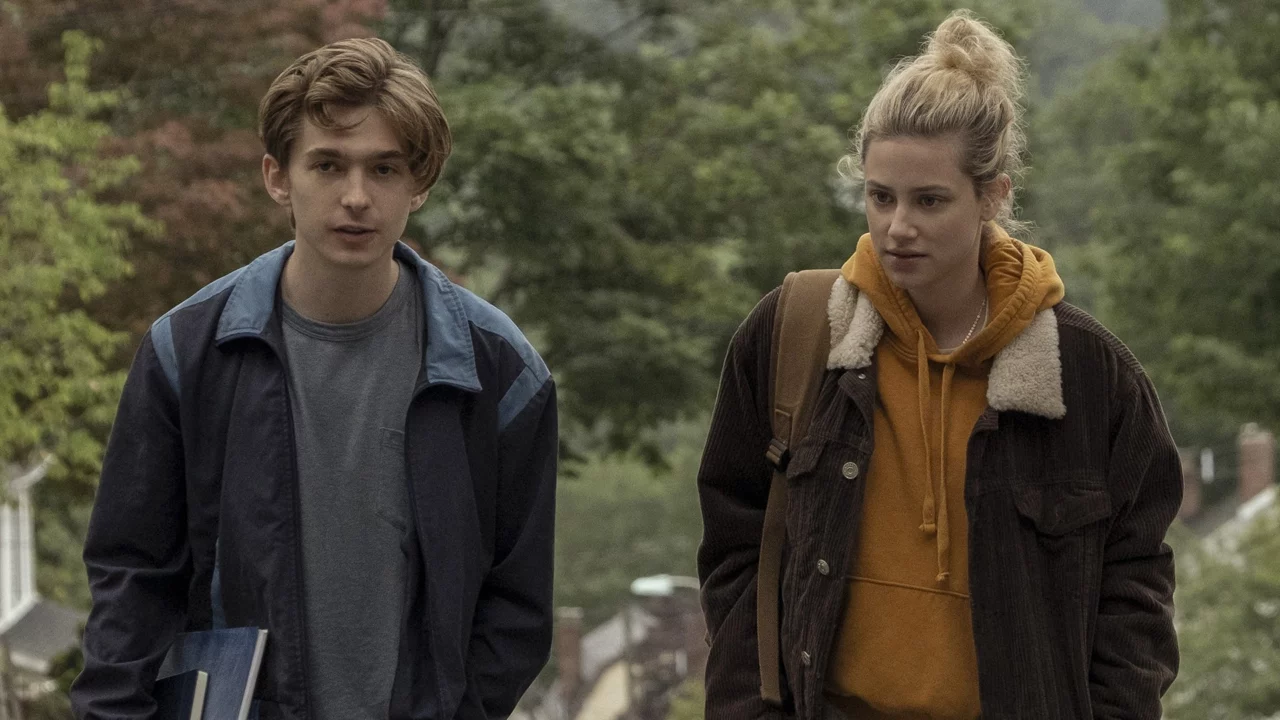
Chemical Hearts (2020) Movie ft. Austin, Lili, and Sarah
Chemical Hearts marks Richard Tanne’s ambitious attempt at crafting a meaningful teen romance in 2020. This Amazon Prime exclusive brings together Lili Reinhart (known for her Betty Cooper role) and Austin Abrams from HBO’s hit series. The adaptation of Krystal Sutherland’s book aims to break free from typical high school movie formulas.
The story follows Henry Page, a quiet senior who dreams of becoming a writer but feels his life lacks interesting experiences. Everything shifts when Grace Town transfers to his school. She walks with a cane, keeps to herself, and carries secrets that slowly unfold throughout their time working together on the school newspaper.

Story Structure and Narrative
This film takes a different path from standard teenage love stories. Henry starts as someone who believes in fairy-tale romance, while Grace represents the harsh reality of loss and trauma. Their connection develops through shared newspaper duties rather than typical meet-cute scenarios.
Grace’s backstory involves a devastating car crash that changed her life completely. She lost someone important and struggles with guilt that goes beyond physical injuries. The film reveals she’s been staying with her deceased boyfriend’s family, creating a complex living situation that affects her ability to move forward.
What makes this narrative interesting is how it refuses to follow expected patterns. Many scenes lead you to think the story will go one direction, then surprise you with genuine human reactions instead of movie magic solutions.

Acting and Character Work
Lili Reinhart shows impressive range moving from her Riverdale character to this more serious role. She captures Grace’s pain without making it feel performative. Her ability to show internal conflict through small gestures and facial expressions drives many of the film’s emotional moments.
Austin Abrams brings genuine sweetness to Henry without making him seem naive or unrealistic. He shows the confusion of a teenager trying to understand complex emotions for the first time. His reactions to Grace’s unpredictable behavior feel natural rather than scripted.
Their on-screen connection works well, especially in quiet moments where they’re just talking or working together. The film benefits from their ability to make ordinary conversations feel meaningful. Supporting characters serve their purpose but don’t get much development time.

Strengths That Stand Out
Honest Mental Health Approach: The film doesn’t pretend that love fixes trauma. Grace’s struggles with grief and survivor’s guilt receive respectful treatment. Her healing process is shown as complicated and ongoing rather than something that happens through romantic love.
Strong Visual Storytelling: Henry’s hobby of fixing broken pottery creates an obvious but effective metaphor. The camera work uses muted colors and natural lighting to create the right mood without being overly stylized.
Real Teenage Dialogue: Characters speak like actual teenagers rather than adults trying to sound young. Conversations flow naturally and include awkward pauses and half-finished thoughts.
Mature Themes: The film handles topics like depression, loss, and physical intimacy with appropriate seriousness. It doesn’t shy away from showing how overwhelming these experiences can feel to young people.
Areas Needing Improvement
Pacing Problems: Some sections drag when the film focuses too heavily on mood over story progression. Certain scenes could be shortened without losing emotional impact.
Underdeveloped Side Characters: Henry’s friends and family exist mainly to provide exposition or move the plot forward. More development would have created a richer world around the main characters.
Obvious Symbolism: While the pottery metaphor works, other symbolic elements feel forced. The film sometimes explains its meanings too clearly instead of trusting viewers to understand.
Uneven Tone: The movie struggles to balance its serious themes with lighter high school moments. Some tonal shifts feel jarring rather than natural.
Production Quality
The technical aspects support the story well. Cinematography creates an intimate feeling that draws you into the characters’ world. Sound design and music choices enhance emotional moments without overwhelming them.
Costume and set design feel authentic to the New Jersey high school setting. Characters dress like real students rather than movie teenagers. The newspaper classroom and other locations look lived-in and believable.
The musical score and soundtrack complement the story effectively. Songs appear at appropriate moments and don’t distract from dialogue or character development.
How Critics and Audiences Responded
Professional reviewers gave mixed but generally positive responses. Rotten Tomatoes shows 60% approval from critics, while Metacritic landed at 57/100. Most praised the lead performances while noting pacing issues.
Roger Ebert’s reviewer called it surprisingly unpredictable and praised Reinhart’s work specifically. Empire magazine appreciated its serious approach to teenage grief while noting some script problems.
Audience reactions varied more widely. Younger viewers often connected with the emotional authenticity, while others found it slow or pretentious. Social media responses highlighted the chemistry between leads as a major positive.
Many viewers appreciated seeing mental health portrayed realistically rather than romanticized. The film’s approach to trauma and healing resonated with people who had similar experiences.
My Overall Assessment
Chemical Hearts works best when it focuses on the genuine connection between Henry and Grace. Their relationship feels real because both actors bring authenticity to their roles. The film respects its audience by not providing easy answers to complex emotional situations.
I appreciate how the movie handles difficult topics without being exploitative. Grace’s trauma is treated as something serious that affects her daily life, not just a plot device to create drama. Henry’s confusion and desire to help feels genuine rather than heroic.
The film has flaws, particularly in pacing and supporting character development. However, its strengths outweigh these problems. It offers a more mature perspective on teenage relationships than most films in this genre.
Rating: 3.5/5
